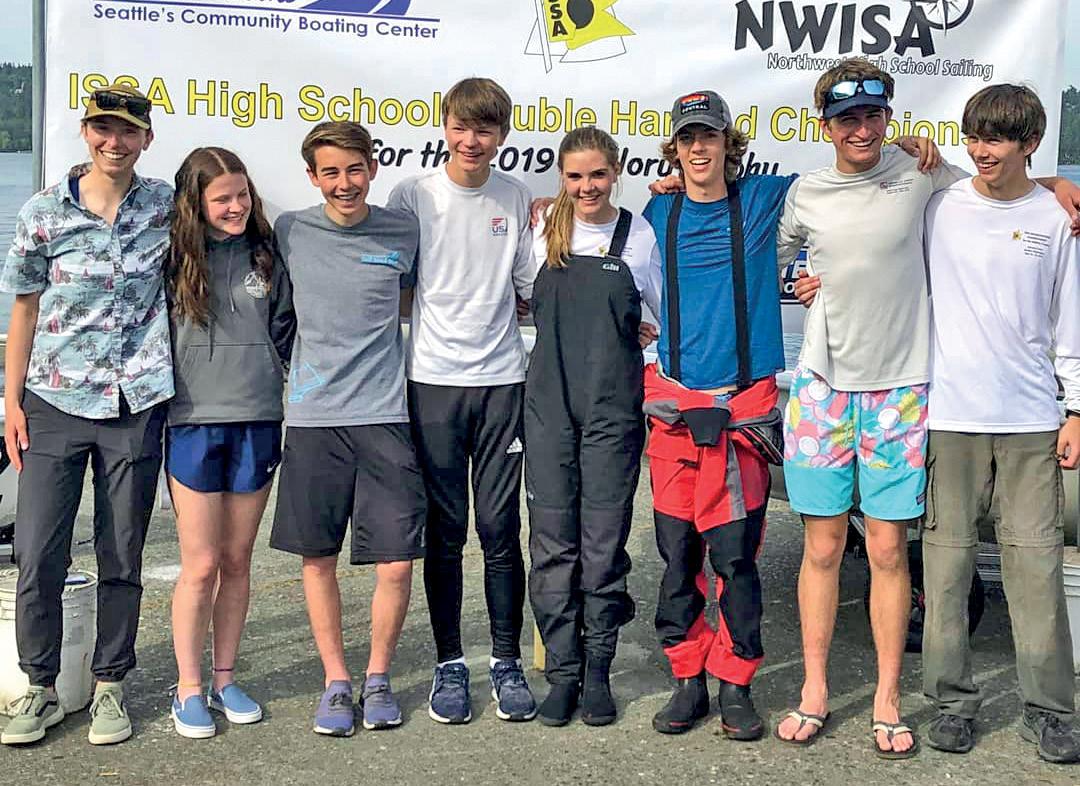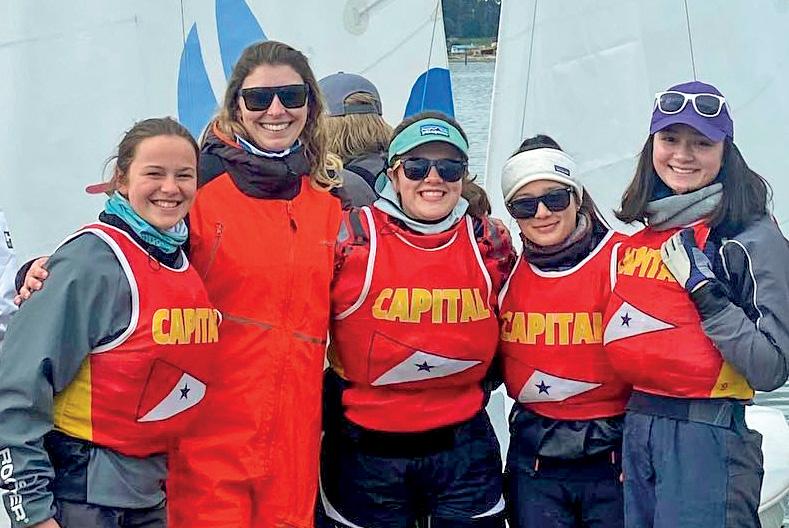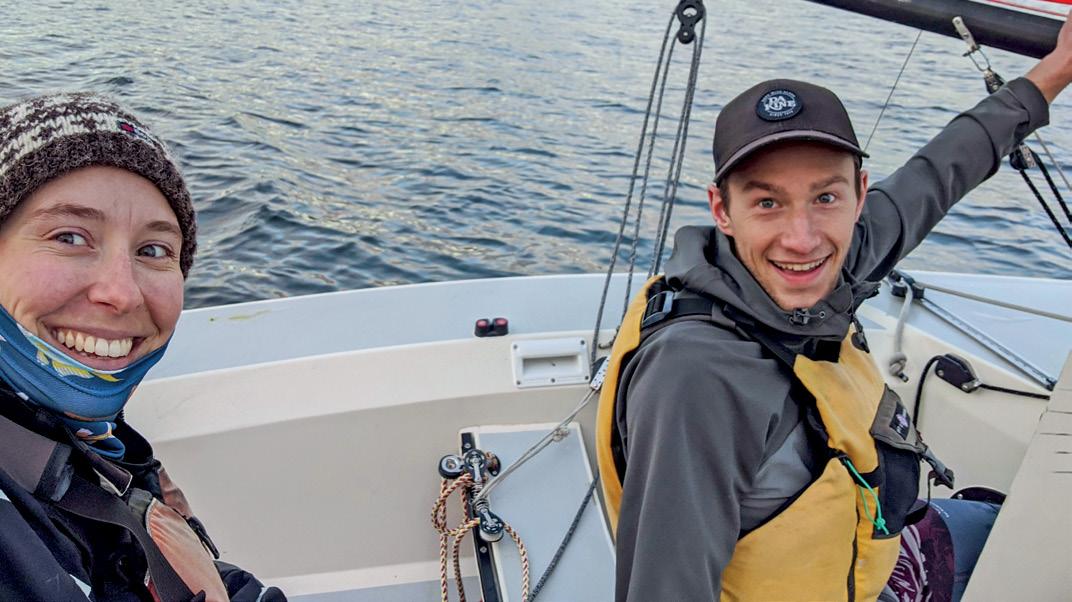
12 minute read
PNW Hero: Sarah Hanavan
from July 2020 48° North
by 48° North
Around the Pacific Northwest, heroes come in many forms—from unsung to ubiquitous, in every generation, making significant contributions across a wide spectrum of boating activity. 48° North is excited to honor some of them in a new series of interviews.
by Joe Cline
48° North: Tell us about your entry into the world of sailing.
Sarah Hanavan: I grew up on Bainbridge Island. My mom signed my brother and me up for parks and rec classes—your generic summer sailing camps. The parks and rec camps on Bainbridge are wonderful. There wasn’t really a racing component to them, just the exposure going sailing in Eagle Harbor every summer. I was able to do that through a scholarship program. My mom is a single mom, so it wasn’t something she would have been able to afford if she hadn’t been able to use that program.
From there, I got interested in racing competitively. It didn’t work to do it full-time with the Bainbridge Island High School team, because I was doing Running Start. But in college at Western Washington University, I joined the Western Sailing Team. And from there, I just never looked back.
You are one of many influential sailors to have roots with the Western Sailing Team. Can you share more about that experience?
The Western Sailing Team is so special. There’s something about that team in particular that has a soul that is hard to describe. Over my four years of being on the team, we had a core group of 10-15 competitors who were pushing for things as lofty as doing well at Nationals and seeking careers in sailing.
I was captain for two years; running the team, hosting regattas, and corresponding with other programs and their coaches. A lot of that experience—both with my friends on the team and with team management—has helped me become a well-rounded adult, and built skill sets to do management and organizational work. When you’re in college, you don’t realize how valuable those things are.
We had a team member who took his own life when I was a junior. That was very emotional and really changed the tone and focus of the team for the next year. It turned out to be a pivotal moment for me as a young sailor, because it could have either been a moment when I walked away from the sport, or really buckled down because I had the sport and the team to get through experience. It made me fall in love with it on another level. So yes, the Western Sailing Team had a huge impact on my life.
Can you talk a little bit about your transition from being a college sailor to working in sailing professionally?
When I was in college, I had worked summers in California at the Treasure Island Community Sailing Center. It was a great experience to coach in California—to see what they were doing competitively and also in terms of community programming— because the scale there is so much larger than what we have in the Northwest. When I graduated, there weren’t any apparent full-time opportunities in the Northwest. But, there was a seasonal Sailing Director position at Bainbridge Island Parks and Rec, where I had learned to sail.
Bainbridge Parks and Rec was really open to making that position more sustainable and I think it could have become more of a “real” job than it was. However, living with your parents and in the community you grew up in gets old. I found a job in Thailand doing bareboat charters—a different route in sailing that I was really excited about. One week before my flight, there was a military coup in Thailand. My visa was revoked and the charter operation shut down. The carpet was pulled out from under my feet.
Jobless, I moved to Olympia, where my partner, Casey, was living. It was really depressing moving to a new place without a job or direction. Casey encouraged me to volunteer with Olympia Yacht Club and their little sailing program. I had a negative attitude about it because I knew the program wasn’t very robust—no full-time staff and maybe three or four kids sailing. I thought it was beneath me a little bit, which is a terrible mindset.
I eventually did start volunteering for them. Of course, I loved it. Working with the kids again was exactly what I needed. That summer, they were able to start paying me when they were bringing in revenue from their classes.
Olympia High School at the Mallory Cup Nationals (Fleet Racing). Olympia broke a NWISA record and placed 11th among the top 20 teams in the country.

During this time, I had a heart-wrenching conversation with a 17-year-old sailor who told me, “I want you to stay on as a coach all through my senior year. I’m afraid you’re going to leave like all the other volunteers have.” Her parents and a handful of others in the program worked with me to do a massive recruiting effort all summer. And it happened! We went from 4 kids to 30 that fall; from two days of coaching per week to five, because now we had to do middle school and a high school program. It just exploded and we never looked back. The program has doubled in size since then.
In retrospect, I wish that younger Sarah had a better attitude about what was possible in the beginning. I try to talk about that with recent graduates from the Western Sailing Team and other programs. While there might not be perfectly minted jobs out there to apply for, there are so many great communities to connect with where you could create opportunities for yourself if you have the vision.
How do you describe your professional sailing involvement now, with Olympia Yacht Club and other organizations?
I’m the Director and Head Coach of the Olympia Yacht Club’s program. That involves managing a summer staff of 12 to 14 instructors.
I’m also an Instructor Trainer for US Sailing, so I teach Level One certification courses. The training that I’ve done with US Sailing has connected me with that organization on the national level. One of my mentors at US Sailing suggested I apply for an International Olympic Committee (IOC) year-long Masters Coaching Enrichment Program. I was accepted and that’s been amazing because that program isn’t just about sailing, but is about sports coaching on a global plane. I was able to do a project about women’s coaching in particular and—with the help of US Sailing, the IOC, and local partners—we were able to run the first-ever Women’s Coaching Clinic this winter in Seattle. It was just awesome.
I know that’s not your only effort to empower and increase activity for women and girls in sailing...
I’m an officer with the Northwest Interscholastic Sailing Association (NWISA), which is the regional body that governs all the High School Sailing events. We’ve run three years now of Northwest High School Girls Championships, and we hosted the most recent one in Olympia. As a district, we try to have those events run by an all-female Race Committee to create that atmosphere where female sailors really feel empowered— giving the subconscious impression that there are possibilities for women at all levels of the sport and the community. They can take on either role in the boat (skipper or crew), they can be a 360 sailor, an athlete, or take on other leadership roles.
Generally, the more competitive the events get, the more you see male skippers and female crews. At Nationals, you could count on one hand the number of teams that have female skippers. It was just dismal. And that’s in all youth sailing events, unless it’s an event specifying female skippers, like Leiter Cup. It starts with the coaches and sailing instructors, with the 16-year-old staff members. Are they reinforcing gender stereotypes with their own biases, not even knowing they’re doing it? Are they putting the boys on the helm more than the girls?
I was very aware of this when I had the opportunity to run a team from square one. That first big fall season, 90% of the kids didn’t know anything about sailing. So, I consciously chose to make all the girls that signed up skippers, because nobody knew any different. I’m seeing the dividends of that now four years later. I have all these incredibly strong female skippers on my team, and a really balanced breakdown of female and male skippers. Now that’s our team culture. You’re not going to diminish the boys’ experience by propping up the girls to skipper more initially; because if some girl starts skippering and ultimately decides the crew position is where she feels most comfortable, at least she’s perfectly sound at steering the boat and confident to do so if she has to. A lot of people who

Capital High School Seniors and Coach Sarah at the last regatta they were able to sail this year.
crew wind up with only 50 percent of the skill set required to sail. I can’t count the number of times I’ve come up to a boat in trouble and you can’t put the crew on the helm because they don’t know how to skipper.
That this is still considered somewhat progressive is crazy to me. Now, there’s a lot of conversation about diversity. That’s really where I would love to see us go—to start having events that are about diversity. If doing it for women first is how we get used to the idea of breaking up the norm, that’s great. But the next step is to get a little more crazy.
What aspects contribute to the success of the programs you’ve been a part of?
To start with: sailing sells itself. In the big picture, kids and teenagers are all the same. It’s not that the kids in Olympia just happen to love sailing way more than the kids in Poulsbo or Everett. It’s just about getting a person that has the knowledge, skills, and motivation to get somewhere and get people excited about it. From the community that develops to the adventures kids have—it’s just about providing that structured framework and doing the hard work of creating the place for it to happen.
Here in the Northwest, we’re producing sailors that can do this and we have communities that are ripe for growth and potential. It’s not about finding a material person who is already uniquely qualified, it’s more about finding a passionate person who probably still has a lot to learn and needs to do a lot of their own growing. But they need to have fertile soil in which to grow. So, organizations need to be able to say, “YES!” And stop saying, “no.” It’s the most frustrating thing to me and it is really insidious because organizations and groups don’t realize they’re doing it. We all have to be open to doing something new and exploring. What I’ve realized is that a lot of people who say no drift away really quickly. They’ll be strongly negative at the onset, but if you just keep being the positive, persistent voice— you will outlast them. There’s always a way to make something happen, I truly believe that.
How do you personally like to go sailing today?
A downside of coaching professionally is that you’re coaching regattas on weekends instead of sailing in regattas, and summers are your busiest time. But Casey and I own two Tasars and one Star. One bizarre silver lining of coronavirus is that I have been sailing more recently than I have in a long time.
We primarily sail the Star just for fun, there’s a little fleet here in Olympia. Casey and I weigh maybe 300 pounds together, so we’re not ever going to have a competitive campaign in our future, but that’s a great boat.
We bought the Tasars because it’s a fun, strong class in the Northwest. The North American Tasar Fleet is hosting Worlds at Shilshole next summer. That would be our first Worlds event. We want to do it for fun, and to try to sail together without wanting to kill each other.
Who is someone you consider one of your sailing mentors and why?
I have a lot of them, but I often point to Andrew Nelson, who is the Youth Sailing Director at the Sailing Foundation.
He was a senior and the captain of the Western Sailing Team when I joined as a freshman. He’s a really big personality— funny and gregarious. I was shy and awkward. My first fall season on the team, I was out of sorts—transitioning to college life, having a lot on my plate with school, and having all these other things going on. I didn’t know if I wanted to keep with sailing. When I told my mom I was thinking about quitting for a while and just focusing on school, she asked, “Well, what is Andrew going to say?” I don’t want it to sound like I was afraid of Andrew, he was just such a good captain and so passionate. I just didn’t want to tell him that I was having doubts because I really respected him.
We’ve been able to stay friends and collaborate since then. He’s the one who got me in touch with US Saling when I was right out of college. Even to this day we talk, sometimes on a weekly basis, about sailing and stuff. I just would not be anywhere I am without Andrew Nelson being a good friend, a good teammate, and just being a person dedicated to the sport of sailing in the Northwest.
Sarah and Casey sailing their Tasar in Olympia.

What should I have asked you about?
I love talking about the kids on my sailing team. Each individual kid is just such an amazing person. Our team is a collective of the high school varsity program, the junior varsity program, and our opti racers who are as young as third grade. All three are active year-round. I miss them so much not being able to run regular practices and be on the water with them. I’m doing Zoom chalk-talks twice per week with all age groups, and to have them still engaged and asking questions, week after week after week without getting to go sailing—it makes me so happy, but also so sad that we can’t do our thing right now.
I love them so much, and I’m so proud of them for so many other reasons than just sailing—the way they treat each other as teammates, the dedication they give to something they’re passionate about, the amount of hard work they put in. It just blows my mind.
As great as this interview already is, this is only part of what Sarah has to share. See the interview in its entirety at 48north.com.
Joe Cline is the Managing Editor of 48° North.









